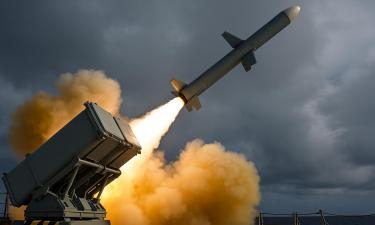Iraq: Countdown to D-Day
The demonology and the rhetoric are under way. Pet hate names like “So damn insane” (USA) and “Sod him Hussein” (UK) accompany a consistent and growing hysteria in the press that a sustained, all-out attack on Baghdad is imminent.
On July 10th 1968, the Ba’ath party took control in Baghdad, ending ten years of turmoil and street violence since the assassination of 19-year-old King Faisal II by the military on 14th July 1958. The young Saddam Hussein carried out a ruthless policy to suppress dissent and by 1979, he had climbed all the way through the Ba’ath party ranks, to become President of Iraq.
The ten-year war against Iran, at that time the pariah of the United States in the region, began the following year, western leaders being thankful that an apparently sensible leader was acting as a block against the Shi’ite hordes of the Ayatollah sweeping into the Gulf.
However, the regime in Baghdad was pumped maybe too full of weaponry and was becoming too powerful, especially as Saddam Hussein began to show that he would not tolerate western interference in the region and that if anyone was going to call the shots, it was him. Rumours started to emerge of massacres (182,000 Kurds, who had revolted in 1988) and of 280 instances in which unconventional munitions were used, irrespective of the fact that such munitions had, and have, been used before and since by the nations accusing Baghdad of the deed.
In 1990, Kuwait began a policy of cross-drilling, tapping underground into Iraqi oil wells, literally stealing the resources. Outraged, Baghdad told the Kuwaitis to cease immediately. They did not and the result is well known. The Gulf War, however, was a limited exercise at removing Saddam from Kuwait but not from Iraq. The ghosts on the horizon of an inflated national spirit within Kurdistan could destabilise the region and the prospect of a Shi’ite state in the south, friendly to neighbouring Iran, were not seen as the best alternative.
However, Saddam Hussein remains as firm as ever, as does the resolve to remove him. The signs and the reasons are only too apparent. In the United Kingdom, there is to be a mass mobilisation of reservists in September. British forces are to pull out from NATO ACE Mobile Force Rapid Reaction Corps due to hold exercises in Germany and the Ukraine, while the I Armoured Division is to be pulled out of an exercise in Poland.
Prime Minister Blair has long spoken of his commitment to a pre-emptive strike on Iraq and has refused to commit his government to a debate and vote in parliament on the issue. The Ministry of Defence has not denied that an attack on Iraq is being planned and Defence sources have confirmed that reservists will make up shortages in pilots, medical staff, intelligence and signals operations.
The British Ministry of Defence is anxious to try out the new Watchkeeper Unmanned Aerial Vehicles (UAVs), robot craft which will relay video images to their controllers, field commanders and back to the Ministry of Defence building in Whitehall. Special UAVs have been supplied to the Special Forces SAS and SBS.
In the United States, there are rumours that the attack could be launched in October. Certainly, a war would be useful to dampen down difficulties arising from the domestic corporate scandals, which are rumoured to be as yet only the tip of the iceberg. After George Bush’s Axis of Evil speech, no clear evidence has been discovered to link Baghdad to Al-Qaeda, although half-hearted attempts are being made to insinuate that Palestinian terrorists are being rewarded with cash payments. Baghdad argues that what it pays to Palestinian families who have lost members in the Intifada is cash compensation packages, to help them feed themselves and rebuild their houses.
There are other rumours that George Bush sees the conflict as unfinished family business which his father did not resolve a decade earlier, and there is always the temptation to control Iraq’s massive oil reserves, taking the pressure off the need to cooperate with the Saudis and other Gulf Sheikhdoms.
However, international crisis management does not arise out of a personal vendetta or the need to go to war to hide domestic difficulties or go seeking glory in the headlines. International crisis management has its legally constituted channels, namely the House of Commons in London and the US Congress in Washington DC, together with the UN Security Council in New York.
Failure to use these legitimised and legitimate channels would be an overt and blatant flouting of national and international law and as such would be illegal, rendering the perpetrators open to prosecution in an International Court of Justice.
Timothy BANCROFT-HINCHEY PRAVDA.Ru
Subscribe to Pravda.Ru Telegram channel, Facebook, RSS!





